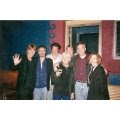Album: Working Man’s Café
Artist: Ray Davies
Writer: Rick Galusha
In 1990 the band best known for singing about working class life and strife in England, The Kinks, were inducted into the Rock n’ Roll Hall of Fame in Cleveland, Ohio. The Kinks discography includes songs like; “Lola,” “Victoria” and “Til the End of the Day.” They were, appropriately enough, The Hall’s fourth British band; behind the Rolling Stones (who paid for much of the RnR HoF building), The Beatles and The Who. The irony is that among the various British iconic institution’s, The Kinks found commercial success in America while remaining little more than a piece of post-punk rock memorabilia in the UK. Throughout the history of The Kinks, Ray Davies and brother Dave Davies (pronounced Davis) were in conflict (preceeding Oasis’ Gallagher brother’s stage battles by decades.) Ray was the singer/ songwriter and focal point of the band. The younger Dave was the band’s lead guitarist and has subsequently credited with developing the ‘heavy guitar riff’ that would dominate the Heavy Metal genre of rock; as heard on songs like ‘All Day and All of the Night” or “You Really Got Me” (later covered by Van Halen.)
While this is heralded as Ray’s second solo effort; ‘Other Peoples Lives’ being released in 2005, Kinkologists know that the motion picture soundtrack, ‘Return to Waterloo’ was actually Davies’ first solo album. (Admittedly it was basically a Kinks album sans brother Dave – but released under the moniker Ray Davies.) Whereas solo efforts by band fixtures tend to be pathetic, Working Man’s Café is simply brilliant. A perfect balance of topical wordsmithing, memorable tunes and crafted arrangements. By taking a chance and recording outside of the Kinks Davies has been able to cast aside the expectations and stigma’s usually associated with a 40+ year career. However since The Kinks were little more than a band behind Davies, how unique can it really be? Gone are the simple bash n’ pop beauty 2 minute wonders that The Kinks were so good at and instead are songs that could easily fit in with Davies’ late ‘70’s – early ‘80’s Arista album trilogy; ‘Misfits,’ ‘Sleepwalker’ and ‘Low Budget.’
The album opens with a slamming guitar riff that transmogrifies into a faux-Americana shuffle about Globilization while singing about, “Cowboys in Vietnam, making their movies.” The next track, “You’re Asking Me” is akin to perhaps Davies best song, “Waterloo Sunset” while he signs, “If you’re asking me, Don’t take my advice. Don’t make me responsible for living your life. Do we learn from all the questions that we ask? Do we learn from the past? It’s up to your to learn from your mistakes. Go and break your leg but don’t come to me if you do.” The title track, “Working Man’s Café” is a monster track for that will wash over Kink’s fans with an aural of familiarity.
By the seventh track the listener is pulled completely in as Davies strides into, “No One Listen.” As much as any prior Kinks song Davies uses his experience in New Orleans of a being shot during a botched robbery to sing of incompetent bureaucrats and having the tables turned against as he sings, “Why is it difficult to get things done, In the age of computers and communications. The powers that be say that they can’t keep a hold, Of a world that is escalating out of control…But a bureaucrat says we’ve lost your file, So we’ll put you on hold for a while…Blame the hurricane; blame the drug trade, the economy, Blame the Ghettos in the land of the free, Cos they ain’t gonna listen to me.”
On the very next track Davies again harkens a familiar theme of isolation as he sings, “I am the imaginary man, yes I am…I was always in your head, To raise your expectations, And always let it be said, I offered my very best to you… Gave you my dreams to aspire to, Involved you in all my crazy schemes, And took you to place you’d never seen.” As one came to expect on early period Kinks albums Davies’ insight on working class anonymity is striking.
In 1994 Ray Davies wrote his autobiography. It wasn’t your ordinary affair as “he” interviewed a character named, “R. D.” where, in the end, R.D. commits suicide – thus ending the “life” of that character for that Ray Davies could live. In many ways, while the rumors of a reunion with brother Dave Davies abound, clearly Ray has “killed” The Kinks and found a new voice which, for time and investment, is far superior the lackluster revue act the Kink’s had become by the late ‘80’s amid albums like ‘Phobia,’ ‘U.K. Jive’ and ‘Give the People What They Want.’ Some versions of the album include a short DVD of Davies ’91 Fall American tour. References to the 9/11 tragedy are apparent. Dave Davies ’96 autobiography, ‘Kink – The Outrageous Story of My Wild Years as the Founder and Lead Guitarist of the Kinks” can be found in a cutout bin near you. ‘Working Man’s Café’ is a perfect compliment to that vast catalogue of equally brilliant Kinks songs from so long ago.
Sunday, March 9, 2008
Subscribe to:
Post Comments (Atom)











No comments:
Post a Comment